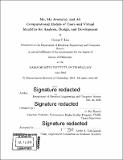Me, my Avatar(s), and Al : computational models of users and virtual identities for analysis, design, and development
Author(s)
Lim, Chong-U
DownloadFull printable version (33.04Mb)
Alternative title
Me, my Avatar(s), and artificial intelligence
Other Contributors
Massachusetts Institute of Technology. Department of Electrical Engineering and Computer Science.
Advisor
D. Fox Harrell.
Terms of use
Metadata
Show full item recordAbstract
As computers continue to increase in adoption and usage, people are spending large amounts of their time interacting in virtual environments. In such environments, people often make use of and represent themselves with virtual identities such as online shopping accounts, social networking profiles, and video game avatars. Despite being technically "virtual," research has shown that virtual identities can reflect and influence peoples' values and preferences that they possess outside of virtual environments (i.e., the "real world"). It is a major challenge to identify and quantify such values and preferences. While qualitative methods (e.g., self-reported surveys) may be employed to gain insight into users' preferences, they are often intrusive and may be subject to survey bias. I present a data-driven approach that combines artificial intelligence (AI) techniques with cognitive categorization theories to develop computational models of users' values and preferences. Such models overcome the aforementioned limitations-and more importantly-enable new ways for such insights to be obtained and understood. For example, they can concretely model how much an application like a videogame may be implicitly biased against a particular user group by analyzing its underlying data structures; they can also be used to reveal how users conform to or subvert conventions by analyzing telemetry data collected from a given application. The software developed for this research can be viewed as computational tools for social analysis. They can enable developers to concretely evaluate if a given system is inequitable (e.g., marginalizing a particular user group); they can also be used to guide developers in resolving such issues. This dissertation includes a comprehensive report on several case-studies of applying these approaches and tools to both (a) publicly available data from commercial sources and (b) data obtained from self-designed experiments conducted in laboratory settings
Description
Thesis: Ph. D., Massachusetts Institute of Technology, Department of Electrical Engineering and Computer Science, 2016. Cataloged from PDF version of thesis. Includes bibliographical references (pages 291-305).
Date issued
2016Department
Massachusetts Institute of Technology. Department of Electrical Engineering and Computer SciencePublisher
Massachusetts Institute of Technology
Keywords
Electrical Engineering and Computer Science.